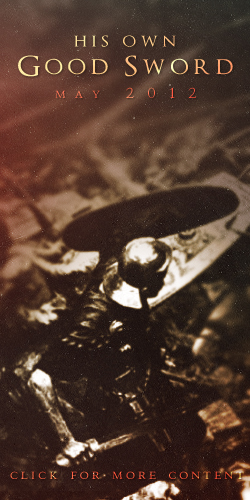Dragon Tale
The dragon and I regard each other.
His eyes are cold, unblinking. He wins the contest every time. He’s small, about as long as my arm from fingertips to elbow. But the size doesn’t really matter. I’ve heard stories about how quickly the beasts can move. In some stories it doesn’t take more than their breath to kill you. I’ve already used up my only weapon, the pail I’d been carrying. Mother had sent me for water sometime last century. My aim was pretty bad. The pail just bounced harmlessly about four feet up the trail from where the dragon is lying. The water that was in it is already gone in the white-hot sun. So now I face him unarmed. His mouth is open wide to show pointed teeth, and he’s hissing. I daren’t turn away. I stand stock-still. A trickle of sweat has started down between my shoulder-blades.
“You been standin there long enough you could stick up your arms and folks’d think you was a Joshua tree.”
The voice comes from behind me. I whip my head around. A man has come down to the stream from the opposite bank of the arroyo, leading a milk-white horse by the reins. A boy, really–he isn’t much more than my age. But he’s got spurs on his boots, a gun holstered on his hip.
“Sorry, ma’am,” he says. He tips his weather-beaten hat to me. “Didn’t mean to startle you.”
“There’s a dragon,” I croak.
“A dragon?”
I point. He brings his horse across the stream towards me, follows my finger with his eyes. The beast watches, still hissing, coiling up now, fixing to strike. The boy unholsters his gun, spins it in his hand with ease, lets off one quick shot. The dragon rears back and drops in a puff of dust and lies still, just like that.
“No match for Ascalon,” the boy says with pride. He holsters the gun again and pats the handle. He smiles at me, sticks out a hand. “Name’s George,” he says.

Life
They called him El Viejo, the Old One, because no one knew his real name anymore, and because he was old enough to remember the world before the Burning.
He talked about it, if anyone cared to listen. He was very old now and he got confused sometimes and Cat knew he just jumbled the stories together every which way, repeating himself, contradicting himself, mixing parts up. But it didn’t matter. She listened anyway.
She tried to picture it while he talked, all of it floating jumbled and disjointed before her mind’s eye: huge cities spinning with sights and smells, sounds and colors; streets flooded with people; sparkling ships on blue oceans; shining planes in the sky (here she tried to picture the rust-eaten hulls out in the junk yard made bright and new again). Clean white electric light against the night-chill and blackness. Food in people’s bellies, water on their tongues. Water turning the dust to black mud underfoot, and new life bursting from it.
That was always where his words took her, in the end. Not to the cities or the oceans or the skies, but to a quieter place, a smaller place–a wet green place beneath trees, a cool silver mist clinging to her skin, a breeze to lift the hair from her sweaty neck, grass and flowers pushing up between her bare toes. There’d be music. Not the brassy blaring music that Paco played from his machine sometimes. Softer music: the song of wind in the trees, the song of brook-water.
That was life, El Viejo said, talking about the old cities. And she always wanted to shake her head, and correct him, and tell him about the green place and the trees. But she didn’t, because it didn’t matter after all.

 Amanda McCrina is an author, artist, student, history buff, coffee connoisseur, cinephile, hockey fan, cat lady, and all-around nerd. She writes historical fiction and fantasy. She also writes about herself in third person. Her debut historical fantasy novel
Amanda McCrina is an author, artist, student, history buff, coffee connoisseur, cinephile, hockey fan, cat lady, and all-around nerd. She writes historical fiction and fantasy. She also writes about herself in third person. Her debut historical fantasy novel 